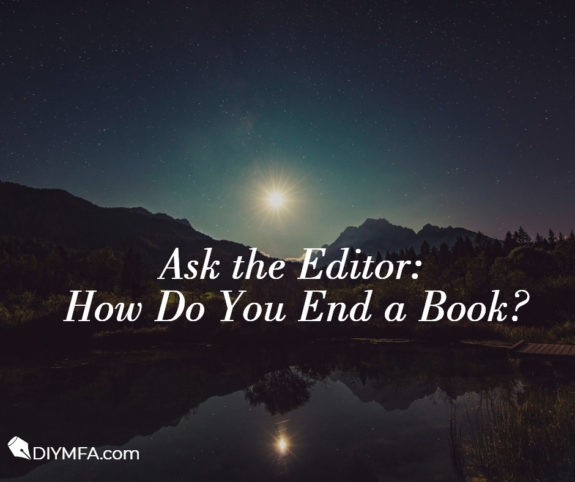I’m nearing the end of a novel–or, I’ve been nearing the end of a novel for some time–and each time I hit the 90k mark, I have an uncontrollable urge to throw the whole thing out and start over. (Uncontrollable as in, I already have. Several times.)
Basically, I look back through the draft under the guise of trying to make the ending gel. Over the course of rereading the first few chapters, I convince myself the problem isn’t the climax, but that the whole book is so deeply flawed a full rewrite is probably the best thing I can do. On some level, I’ve recognized this as a form of creative resistance, and understand routinely scrapping my projects isn’t part of a productive writing process. But it’s also hard to ignore the fact that there are some serious structural issues with my draft.
So, in every sense of the question, how do you end a book?
Need Some Resolution
Dear NSR,
I’d like to address the problem of ending your book in two ways: the literal ending (also known as “The End”) and the also literal ending (also known as “finishing what you’ve started”). Both of these endings–and knowing when and how to execute them properly–are problematic for a lot of authors. But they are also completely doable with a little patience and deliberate action.
What makes an ending?
Let’s talk about what makes an ending. Whether you’ve outlined a three-act structure you’re following to the letter, or you’re a discovery writer making things up as they come to you, there are three questions that can help you figure out if it’s time for “The End”.
1) Is your main conflict resolved?
When the story began, something or someone stood between your main character and their ultimate goal. Has your character overcome (or been overcome by: see Metamorphosis by Franz Kafka) what stood in the path of their ultimate happiness? I love the world of Harry Potter, but I also recognize that once Harry defeats Voldemort, the story has reached its conclusion.
2) Is your story’s main question answered?
Your story’s main question is linked to the conflict. What is driving your readers to follow along with your characters? Some examples: Will Harry defeat Voldemort? Will Katniss survive the Hunger Games? Will Charlie make it through the chocolate factory and get a lifetime supply of chocolate?
3) Has your character reached their goal?
Whatever it was that your character was missing at the beginning of the story, have they discovered it? Have they found they could live without it?
What you may notice from these three questions is they all have something to do with how the story began. When we think about endings, we have to acknowledge how they’re linked to beginnings. Some of the best endings directly mirror their beginnings. They show the arc the character has followed along their journey, and give a sense of resolution that leaves the reader satisfied. The story’s promise has been fulfilled.
Endings Mirror Beginnings
In Hild by Nicola Griffith, the story literally begins and ends with the main character in a hazel coppice, breathing in the scent of the earth, grounding herself and connecting to the world. But the character who began the novel, a young child who had yet to experience the larger world or her place in it, is very different from the one who ends the novel. It shows in the way she inhabits the scene.
Look at your story’s beginning. What assumptions about the world did your character begin with? What thing did they think they could never live without? What did they never think they would be able to do? And where are they now? How have they changed? Did they get what they wanted? If not, can the reader justify why it’s better that way? Then you have an ending.
Finishing What You Start
Now to address your fatally flawed manuscripts. All the writing you do has merit. However flawed a piece is when you finish it, you’re still learning from it along the way. Yes, some manuscripts will require more finessing than others to reach a state in which you’re satisfied you can share them with others. Sometimes you will decide a particular manuscript is going to require more effort than you want to give it. And sometimes you should definitely put that manuscript into a trunked file and move on to the next project. But not all the time.
There comes a time when you need to give your writer self that extra nudge to do the work to fix the structural flaws, a time when a story or a character is so important you can’t let it go. If, when you decide your manuscript requires too much work to complete, you’re scrapping it out of fear of failure, I challenge you to check that urge. So much character growth comes from completing something and putting it out into the world. Scary and challenging as that may be, it’s the purpose of storytelling: to tell a story. Someone else may really need to read it.
How to “Ask the Editor”
Send your questions to ekauffman@writingrefinery.com. Limit yourself to a few paragraphs to introduce yourself and the problem at hand. “Brevity is the soul of wit,” after all. And keep an eye out for opportunities to send in longer submissions for critique.
 Elisabeth Kauffman is a freelance editor in California. Her favorite genres are YA fantasy, sci-fi, and romance. She regularly obsesses over board games, Doctor Who, and Harry Potter. Come share your ideas with her on Facebook and Twitter and on the web at www.writingrefinery.com. Also, check out her author website and her author page on Facebook.
Elisabeth Kauffman is a freelance editor in California. Her favorite genres are YA fantasy, sci-fi, and romance. She regularly obsesses over board games, Doctor Who, and Harry Potter. Come share your ideas with her on Facebook and Twitter and on the web at www.writingrefinery.com. Also, check out her author website and her author page on Facebook.







